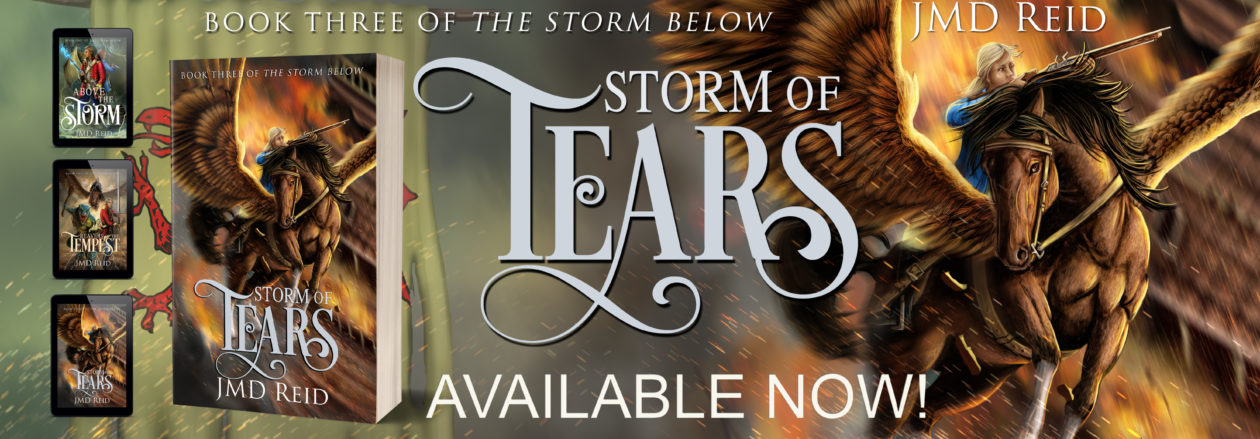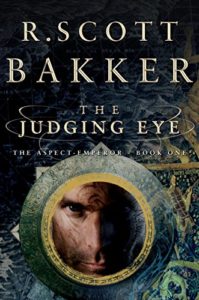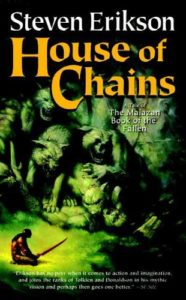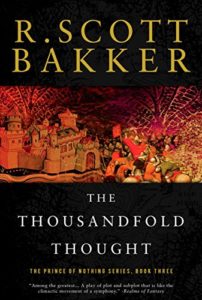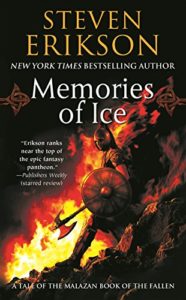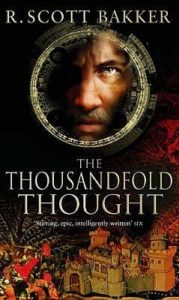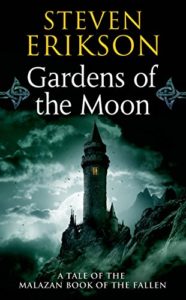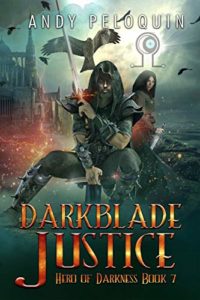Reread of The Aspect-Emperor Series
Book 1: The Judging Eye
by R. Scott Bakker
Chapter One
Sakarpus
Welcome to Chapter One of my reread. Click here if you missed the Prologue!
Upon the high wall the husbands slept, while ‘round the hearth their women wept, and fugitives murmured tales of woe, of greater cities lost to Mog-Pharau
—“THE REFUGEE’S SONG,” THE SAGAS
Pretty straight forward, a reminder of the devastation caused by the First Apocalypse. The men are sleeping at their posts, unable to leave the defenses in case of attack while their women weep because all their children are stillborn. They hear the rumors. They know what is coming.
It is fitting to open Chapter One which also starts out with the Great Ordeal and its mission to stop the Second Apocalypse and the re-awakening of the No-God. Here are the stakes that are being gambled upon. Kellhus has to surpass the original Ordeal that Anasûrimbor Celmomas led two thousand years. He only had to cross the final leg of the Great Ordeal’s march. Kellhus’s army has to survive the ruins of the north just to reach Celmomas’s starting point.
Also, it’s good to know how to pronounce Mog-Pharau. It rhymes with woe. Though the selection is written out as prose, it’s lyrical poetry.
Early Spring, 19 New Imperial Year (4132 Year-of-the-Tusk), The Kathol Passes
The tracks between whim and brutality are many and inscrutable in Men, and though they often seem to cut across the impassable terrain of reason, in truth, it is reason that paves their way. Ever do Men argue from want to need and from fortuitous warrant. Ever do they think their cause the just cause. Like cats chasing sunlight thrown from a mirror, they never tire of their own delusions.
Across the lands, priests of the Thousand Temples and Judges of the Ministrate preached the Truth and hunted for those who disputed it or ignored it for greed. Caste-slave and caste-noble alike are taught “the Great Chain of Missions.” This is how each person’s job helps other people’s job allowing the Empire and the Great Ordeal to succeed against “the apocalyptic designs of the Consult.” The Great Ordeal is the greatest host in the history of mankind. It took ten years to prepare. They have gathered for their march across the “Sranc-infested Wilds of the Ancient North” to reach Golgotterath.
“It was a mad endeavor.” It was no simple task. It required a massive movement of food and supplies. A knight, his mount, the pack mules that carried the supplies, and the slaves who prepare his supper all needed food. “This was why the most arduous battle waged by the Great Ordeal would not be against the Consult legions, but against Eärwa’s own wild heart.” They had to survive to make it to Golgotterath. So for years, the New Empire produced food and stored them in granaries while herds of livestock were driven north. The records to track this required their own warehouses to store them.
The call to arms did not come till the last.
The Zaudunyani come across the Three Seas to take up the Circumfix from Conryia to Kian. The Schools send their sorcerers including the new Saway Compact of Gnostic witches. Preeminent among them is the Mandate who are no longer seen as fools. They gather in Oswenta in Galeoth, swelling the city with foreign lords and soldiers. “The bowl of each nation had spilled, and now their distinct and heady flavors swirled together, continually surprising the palette with some unheard-of-combination.”
Summer and autumn passed. The lessons of the Holy War are remembered. The officer core is made of Zaudunyani veterans who won’t allow any trespasses. Punishments are swift and lethal because too much was at stake. This is the Shortest Path. “Mercy required a certain future, and for men, there was none.” Two skin-spies are uncovered by Kellhus and publicly executed. The Great Ordeal passes winter at the city of Harwash where the caravans that travel to Sakarpus and Atrithau depart from. Twenty thousand die to lungplague.
It was, the Aspect-Emperor explained, but the first of many tests.
As spring approached, preparations to march were underway. Men weep when the order to march is given. As they march, the men feel like the entire world is kneeling before them, approving their actions. King Saubon of Caraskand, who’s one of the two Exalt-Generals, leads the first host with the faster units. Kellhus’s eldest sun, Kayûtas, leads the Kidruhil with Conphas. They are the most famed heavy cavalry in the Three Seas. Sakarpus’s retreats before them, leaving only their skirmisher to harass the Great Ordeal. Behind them, King Proyas of Conryia leads the rest of the host, including the sorcerers. The column is so long, communication between the front and the back is too great for any rider to travel it quickly.
It snowed the fourth night, when the priests and judges led ceremonies commemorating the Battle of the Pass, where an ancient alliance of refugee Men and the Nonmen of Cil-Aujas had defeated the No-God in the First Apocalypse, so purchasing the World a year of precious respite. Nothing was said of the subsequent betrayal and the extermination of the Nonmen at the hands of those they had saved.
As they march, they sing to Kellhus, to their own might, to their wives and families, and about the world they would save. At evening, they shed armor to pray and listen to sermons. It took days for them all to file through the pass onto the “thawing fields of the Sagland.” The Sakarpi have left scorched earth behind, the King of Sakarpus hoping hunger would save his city.
Few Three Seas Men had ever seen grassland steppes, let alone the vast and broad-back Istyuli. Beneath grey skies, with tracts still scabbed with snow, it seemed a trackless and desolate place, a precursor to the Agongorea, about which they had heard so much in endless recitations of The Sagas. Those raised on the coasts were reminded of the sea, of horizons as flat as a rule with nothing but limits for the eye to fasten upon. Those bred along desert margins were reminded of home.
It was raining when the multitudes climbed into the broad scruffs of land that lifted the Lonely City above the plain. At last, the two Exalt-Generals clasped arms and set about planning the assault. They scowled and joked and shared reminiscences, from the legendary First Holy War to the final days of the Unification. So many cities. So many campaigns.
So many proud peoples broken.
Sorweel finds sleep eluding him so is already awaken when the emissary from the Great Ordeal comes to speak with his father, King Varalt Harweel II. Sorweel attends as the crown prince of Sakarpus, as he has attended all such important meetings. “But until recently, ‘important’ had meant something quite different.” Fights with Srancs, diplomatic issues with Atrithau, disgruntled nobles. He’s usually bored. Now he’s scared. He’s a year from his “first Elking,” on the cusp of full manhood, and is staring at King Nersei Proyas standing before his father. Through translators, Proyas broaches what King Harweel says about Kellhus. Harweel sneers about his “blasphemy,” showing his disdain for Kellhus’s godhood.
“Blasphemy…” the Exalt-General said. “He would not say that.”
“And what would he say?”
“That you fear, as all man fear, to lose your power and privilege.”
Sorweel’s father laughed in an offhand manner that made the boy proud. If only he could muster such careless courage.
Harweel, sounding merry, asks if Proyas actually sees him as using his people as pawns to protect them as opposed to standing up to Kellhus to protect his people. Proyas does see it that way by saying no man can “stand between a God and the people.” It unnerves Sorweel how Three Seas Men speak of Kellhus as a living god. Harweel says his priest call Kellhus a demon.
“They say what they need to keep their power safe,” the translator said with obvious discomfort. “They are, truly, the only ones who stand to lose from the quarrel between us.”
To Sorweel, the Aspect-Emperor had been an “uneasy rumour.” His earliest memories are sitting on his father’s knee as traders spoke about Kellhus. From them, Sorweel had heard about everything in the south. His father would always warn that one day, Kellhus would come for them.
“But how can you know, Da?”
“He is a Ciphrang, a Hunger from the Outside, come to this world in the guise of a man.”
“Then how can we hope to resist him?”
“With our swords and sour shields,” his father had boasted, using the mock voice he always used to make light of terrifying things. “And when those fail us, with spit and curses.”
But the spit and the curses, Sorweel would learn, always came first, accompanied by bold gestures and grand demonstrations. War was an extension of argument, and swords were simply words honed to bloodletting edge. Only the Sranc began with blood. For Men, it was always the conclusion.
Perhaps this explained the Emissary’s melancholy and his father’s frustration. Perhaps they already knew the outcome of this embassy. All doom requires certain poses, the mouthing of certain words—so said the priests.
Sorweel can feel Kellhus lurking outside the walls. “An itch, a name, a principle, a foreboding…” Sorweel knows they have come to kill the man, rape the women, and enslave the children. His father is boasting how Sakarpus survived the No-God and will survive Kellhus.
The Exalt-General smiled, or at least tried to. “Ay, yes… Virtue does not burn.”
Harweel asks what that means and Proyas explains all that is left after death is the good things your children record about you. “All men flatter themselves through their forebears.” Harweel snorts and says Sakarpus is still around, proving his strength. But Proyas says Kellhus has been here when Sakarpus was merely the frontier of a great empire. Its lack of importance is why Sakarpus survived. Chance is ever as fickle as a whore. The silence from his father unnerves Sorweel. The stakes were crushing his father. He was pretending everything was fine, but Sorweel could see the lie.
Proyas continues that the entire Three Seas and all the schools are here. Proyas pleads with Harweel to see that he can’t win, appealing to him as a fellow warrior who has fought and seen the terrors of war.
Another ashen silence. Sorweel found himself leaning forward, trying to peer around the Horn-and-Amber Throne. What was his father doing?
“Come…” the Exalt-General said, his voice one of genuine entreaty. “Harweel, I beg of you, take my hand. Men can no longer afford to shed the blood of men.”
Sorweel can’t believe how aged his father appears. He’s not old, but looks it, his crown heavy. For a moment, Sorweel wants to speak to cover his father’s weakness, but Harweel finds his strength. He tells Proyas if he doesn’t want to fight, then leaves and march to die at Golgotterath or return to “hot-blooded wives.”
As though deferring to some unknown rule of discourse, Proyas lowered his face. He glanced at the bewildered Prince before returning his gaze to the King Sakarpus. “There is the surrender that leads to slavery,” he said. “And there is the surrender that sets one free. Soon, very soon, your people shall know the difference.”
“So says the slave!” Harweel cried.
The Emissary did not require the translator’s sputtering interpretation—the tone transcended languages. Something in his look dismayed Sorweel even more than the forced bluster of his father’s response. I am weary of blood, his eyes seemed to say. Too long have I haggled with the doomed.
He stood, nodding to his entourage to indicate that more than enough breath had been spent.
Sorweel was hoping his father would take him aside and explain why he appeared so fearful. To Sorweel, his father is the bravest man. He’d earned it through is room, revered by his Boonsmen and feared by the Horselords. “How could he of all Men be afraid?” Sorweel fears his father is holding back something important. Sorweel can only watch in the wake of Proyas’s departure as his father gives orders. At dawn, he is marched through the streets with his father’s High Boonsmen, seeing the refugees from the Saglands who’d entered the city, mothers looking dazed as herding their children. Sorweel wants to fight, but he hasn’t had his Elking, so he’s not allowed.
It begins raining as the hours past. It soaks through his armor. He feels useless and miserable. Finally, his father calls for him after a while. He’s brought to an empty barrack and warms his hands at a fire with Harweel. His father is troubled. Sorweel has no idea what to say.
“Moments of weakness come upon all Men,” Harweel said without looking at his son.
The young Prince stared harder into the glowing cracks.
“You must see this,” his father continued, “so that when your time comes you will not despair.”
Sorweel was speaking before he even realized he had opened his mouth. “But I do, Father! I do desp—!”
The tenderness in his father’s eyes was enough to make him choke. It knocked his gaze down as surely as a slap.
His father explains that men who see things in absolute terms can’t handle fear or despair. It breaks them because they have not struggled with doubt before then. His father asks Sorweel if he’s a fool like that. Sorweel is hurt because the question is genuine. He answers no. He has so much fear and doubt in him. He can’t speak it as he feels ashamed for doubting his father. He realized he’d been a burden to his father instead of supporting him on this day. Before he can explain his thoughts, three Horselords enter, calling for them.
Forgive me…
Standing on the walls of Sakarpus, he still feels warm after his talk with his father. He’s in the northern tower It’s raining. He stares at the thick walls and can’t imagine them being destroyed. It’s lined with soldiers in the “ancient armour of their fathers.” Archers wait to fire arrows. He’s proud of his people’s courage and determination. He knows that beyond the rain-choked gray, the Great Ordeal lurks.
He says the war prayers to Gilgaöl like he was trained and to Anagke, the Whore of Fate, to keep him from bad luck. The High Boonsmen pray around him for deliverance from “the Aspect-Emperor’s grasping hand.” Sorweel tries to convince himself that Kellhus is a demon and will lose.
A horn rings out. After a pause, more sound. “Suddenly the whole world seemed to shiver, its innards awakened by the cold cacophony.” More prayers and curses are muttered by unnerved men. The horns die while a father tells his son to “Take heart,” and speaks of an omen that means they’ll have good fortune, but the man’s confidence sounds forced.
Peering after the voices, Sorweel recognized the Ostaroots, a family whom he had always thought hangers-on in his father’s Royal Company. Sorweel had always shunned the son, Tasweer, not out of arrogance or spite, but in accordance with what seemed the general court attitude. He had never thought of it, not really, save to make gentle sport of the boy now and again with his friends. For some reason, it shamed Sorweel to hear him confessing his fears to his father. It seemed criminal that he, a prince born to the greatest of privileges, had so effortlessly judged Tasweer’s family, that with the ease of exhalation, he had assessed lives as deep and confusing as his own. And found them wanting.
His remorse is swallowed up by warning shouts. Out of the rainy mist, siege towers appear. Their size surprises him. They are massive and had to be carried across the wilderness in pieces to reach here. They crawl forward in a V formation, covered in tin armor. They have the Circumfix painted across their fronts. Sorweel had seen that symbol tattooed on missionaries his father had ordered burned. Everyone on the wall grows breathless as they approach. The battle has finally begun. The previous months of stress are over. Behind the towers marches the vast Great Ordeal.
Once again the horns unnerved the sky.
Sorweel sees ten times the number of the defenders (who themselves number ten thousand) approaching. So many strangers who came from lands he’d never heard of. These people didn’t care about Sakarpus. “The Southron Kings, come to save the world.” Sorweel had imagined those lands, wanting to run away as a child to a place where “Men yet warred against Men.” He’d learned, however, to hide his fascination. The South is viewed with contempt. “It was a place where subtlety had become a disease and where luxury had washed away the bourne between what was womanish and what was manly.”
But they were wrong—so heartbreakingly wrong. If the defeats of the previous weeks had not taught them such, then surely they understood now.
The South had come to teach them.
King Harweel appears at his son side and tells them not to fear the Schoolman. They won’t attack because of all the Chorae Sakarpus possesses. The king is inspiring his son and the others. Harweel gives a rousing speech about how they stood unbroken against the Sranc and—
His speech is cut off by a stork swooping down before him, startling everyone. Sorweel presses on his belly, feeling the Chorae tied against his bellybutton. The stork shouldn’t be flying in the rain. The stork stares at them without fear, unnerving the men. Harweel pushes himself forward to stand over the stork. A bright light in the sky, like a star, draws Sorweel’s attention. When he looks back, the stork is gone.
Activity explodes across the battlement, men shouting as the siege towers move forward as the star winked out. It reappeared closer over the front of the marching army. Sorweel realizes that there is a man or a god surrounded by blue light
Sorweel fond himself clutching the pitted stone of the battlements.
The Aspect-Emperor.
The rumor. The lifelong itch…
Sorweel cries a warning to his father as heavy winds blow rains over the walls. Ballistae fire Choraetipped bolts, but the sudden wind cuts their range. They miss him. At the same time, Sorweel hears words of sorcery. Silver lines race out from Kellhus, forming “incandescent geometries, a sun-bright filigree.” Sorweel realizes Kellhus is making mist to blind them. The Southron armies are singing hymns as they advanced.
Harweel grabs his son and tells him to go to the Citadel. That it was a mistake to bring him here. Sorweel is horrified, protesting that his father would treat him like a child. He cries out, “My bones are your bones!”
Harweel raised his hand to Sorweel’s cheek. “Which is why you must go. Please, Sorwa. Sakarpus stands at the ends of the world. We are the last outpost of Men! He needs this city! He needs our people! That means he needs you, Sorwa! You!”
Sorweel protest that he won’t leave, crying hot tears hidden by the cold rain. His father punches him and knocks him to the ground and orders Narsheidel to carry him to the Citadel. Narsheidel obeys and drags Sorweel away. He cries out in protest, seeing his father one last time before the fog hides him.
“Nooooooo!”
The clamour of arms descended upon the world.”
Sorweel continues his struggle against Narsheidel, but the man won’t relent. He sees his father’s eyes watching him, full of love and concern and even regret. He sees a father’s pride and hope that “he might live with greater grace through the fact of a son.” Soon, they’re in the city streets, soldiers rushing to the fight.
And a solitary figure in the midst of the confusion, crouched like a beggar, only clothed in too much shadow…
And with eyes that blinked light.
The Herder’s gate is destroyed with sorcerery. The enemy flood into the streets. Men die, killed by sorcery. A siege tower reaches the wall supported by Angogic sorceries. Harwell is dragged farther and farther from the battle while his father’s blue, beseeching eyes fill his mind. He reaches the Citadel where he once again sees Kellhus as “bright as the Nail of Heaven—only beneath the clouds.” Narsheidel is overcome with fear while retainers and guards ask where the king is. In his panic, Narsheidel is screaming that the Citadel must hold secrets that will save them because it is old. He’s dragged to an antechamber where he finally shouts at Narsheidel to stop. He asks where his father is and is told that Harweel is dead.
The words winded him. Even still, Sorweel heard his own voice say, “That means I am King. That I’m your master!”
The High Boonsman looked down to his palms, then out and upward, as though trying to divine the direction of the outer roar—for it had not stopped.
“Not so long as your father’s words still ring in my ears.”
Sorweel looked into the older man’s face, with its strong-jawed proportions and water-tangled frame of hair. Only then, it seemed, did he realize that Narsheidel too had loved ones, wives and children, sequestered somewhere in the city. That he was a true Boonsman, loyal unto death.
Sorweel starts to shout that his father is dead when the wall explodes. He is thrown to the ground while the commander of the Citadel, Lord Denthuel, has his head crushed by debris. Sorweel lies stunned as he stares at a gaping hole. He doesn’t remember if he spoke. Through the hole, he sees the Aspect-Emperor striding through the air. The rain doesn’t touch him.
The shining demon crossed the threshold, framed by gloom and deluge.
A nameless guard flees when Kellhus steps through the breach. Narsheidel charges. Kellhus smoothly doges and whips out his sword, beheading the Boonsman. “The demon” stares at Sorweel the entire time, but Kellhus’s eyes seem far too human.
“On his knees, Sorweel could do naught but stare.”
Kellhus feels unreal, like he’s both physically here and in a spiritual place. He stands taller than Sorweel’s father and wearing a mail of nimil (Nonman steel). He wears the severed heads of two demons on his belt, and he has scabs of salt on his skin. The “vision” announces his identity and Sorweel pisses himself and collapses onto his belly.
“Come,” the man [Kellhus] said, crouching to place a hand on his [Sorweel’s] shoulder. “Come. Get up. Remember yourself…”
Remember?
“You are a King, are you not?”
Sorweel could only stare in horror and wonder.
“I-I d-d-d-on’t understand…”
A friendly scowl, followed by a gentle laugh. “I’m rarely what my enemies expect, I know.” Somehow, he was already helping him to his feet.
Kellhus explains that this fight was a mistake, he’s not a conqueror, but here to save mankind. Sorweel calls him a liar. Kellhus tells him to grieve because it’s natural. “But take heart in the fact of your forgiveness.” Sorweel asks how Kellhus can forgive anything. Kellhus says Sorweel misunderstands what he meant.
“Misunderstand what?” Sorweel spat. “That you think yourse—!”
“Your father loved you!” the man interrupted, his voice thick with a nigh-irresistible paternal reprimand. “And that love, Sorwa, is forgiveness… His forgiveness, not mine.”
The young King of Sakarpus stood dumbstruck, staring with a face as slack as rainwater. Then perfumed sleeves enclosed him, and he wept in the burning arms of his enemy, for his city, for his father, for a world that could wring redemption out of betrayal.
Years. Months. Days. For so long the Aspect-Emperor had been an uneasy rumor to the South, a name heaped in atrocity as it was miracle…
No more.
My Thoughts
Bakker starts right off with a discussion on men and how they are controlled by Cause and Effect. Humans do not like being the villains so we always rationalize our actions and find excuses for them. Some are better than others, but most do it. We come up with why we lie, we cheat, we steal. Why we are selfish.
We spin out our delusions to justify our crimes.
“Men, all Men, warred all the time.” Pure Bakker there. Men are in competition, and war is the ultimate competition. Whether they are competing (warring) with the field they till or competing for the affection of their lover.
It’s clear Bakker thought a lot about how the host would survive the march. It’s great to see that level of detail.
Hello, skin-spies. Slipping them in early. Need to remember that they exist because there’s another one out there.
Men and their delusions are illustrated with: “The Men of the Ordeal could feel it: an approving world, a judging world.” Also, we see judging again. The Judging Eye does exactly what these men believe is happening as does the Inverse Fire.
We have our first reference to Cil-Aujas, the Nonman ruin which dominates the finale in this book. We get the first glimpse of its history, how the humans and Nonmen fought off the No-God and then how the humans later butchered them. It’s a whitewashing of history as well as planting the first seeds for a big story hook to come.
Bakker starts off the Great Ordeal by mirroring how it will end. The army crosses a plain that has been depleted of food, just like they’ll find when crossing the Agongorea, the Field Appalling. There, hunger will reduce them to cannibalism to survive. Like with Sakarpus, the Consult tries that same tactic of starvation to defeat the Great Ordeal. Only we see the armies here at the start, strong and proud and confident, eager to break another proud people.
They don’t realize they’re a proud people.
Bakker’s irony is on full display with the Great Ordeal fighting to save mankind by starting his campaign with conquering a city that has stood up against the Consult and the Sranc since the Second Apocalypse ended. In other fantasy, Sakarpus would welcome and aid the Great Ordeal.
Sorweel is our primary POV for the events of the Great Ordeal. He’s a young man who has to grow up and see the world for what it is. He still idealizes his father like any boy would. It’s easy to see someone as being brave when you don’t know the fear inside of them. It’s as Bakker described in an earlier book, that humans are a two-sided coin. There’s the face the world sees of us and the face we see of ourselves. You can never see how the world sees you, and the world can never see how you view yourself.
Proyas is trying diplomacy here. It is admirable. Harweel is as Proyas describes. He wants to keep his power. He seems like a good man, so he probably has his reasons like protecting his people and defying a demon. The rationalization to justify his desires. After all, Sakarpus survived the No-God. How could Kellhus threaten them?
Kellhus is a Ciphrang… An interesting comment to have in the prose given the deal he’s made Ajokli between the two series.
Bakker brings us some good insight on fighting and why it happens. Some say war is the failure of diplomacy, others say it’s the only way to accomplish it. Force is required to bring people to the peace tables. The threat of it or its actual unleashing. The outcome can often be seen ahead of time, which only makes the tragedy to come pointless. But people are stubborn. They have hope. They don’t want to see reality. They are consumed with pride or fear. A hundred reasons that can lead to men dying on the battlefield. They’re rarely good ones.
Well, Chapter One and fortune is compared to a whore!
Sakarpus says they are here because of the strength of their wall, the might of their ancestors, and the Chorae Horde (which why the Holy War is here). Kellhus says they were on the periphery of events and lucked out that the consult didn’t come. I imagine it’s more in the middle. They did weather attacks but they never felt the full brunt of the No-God.
Sakarpus reminds me of Game of Thrones. The North talked a good talk about how they were strong than their southern men, worth ten of them, and then Arya finds them slaughtered when Ned Stark is captured. She’s confused that their bravado didn’t match reality. Sorweel is starting to see through his father’s bravado before the face of the might before them.
The end is writ in stone. Everyone knows it, but Harweel cannot break free of the expectations that lie on him and the fear of losing all he has. He is grasping at straws to stay free and Proyas knows it. We see that after twenty years, Proyas has grown with more compassion. This isn’t the zealot we first met, but the man who witnessed Shimeh burn.
How many cities has he seen burned since?
I make no bones about how much I dislike Kellhus. What he does to Proyas in this series is brutal. The shortest path as no room for compassion or love.
Great father and son stuff between Sorweel and his father. His father is getting him ready for what’s to come. The fact that they’re going to lose. Harweel can’t bring himself from surrendering without a fight. He must feel trapped by duty and expectation. Sorweel can start clean as the subject ruler. He recognizes how Kellhus operates. He prefers to leave those in place who will be followed if they bend the knee. Sorweel is that person. Someone he can use as both a hostage and a ruler to keep Sakarpus in line after the defeat. Harweel needs his son to be strong enough to survive what is coming.
Sorweel is maturing fast now, feeling empathy to a boy he disliked out of habit. Humans fall into a social hierarchy, and you act in your place to maintain it or risk falling from your place and losing the ability to climb higher.
It’s interesting the relief that can come when the dreaded thing happens. You can finally deal with it and not worry about it, even if it goes bad. Stress is not good for humans in our current modern world. Its designed for life-and-death situations, not worrying for days or weeks on whether you’re going to lose your job. It’s not great having that building pressure with no release for too long.
Warrior cultures always think they are superior in military might to more civilized nations. They can often be surprised then to lose. Those countries might not have the culture on the surface, but that doesn’t mean they’re not humans who, when need to, can be just as aggressive to survive. Barbarians might win when they sweep unprepared against a “soft” enemy, but if the enemy can regroup, they can fight back. The Japanese saw the Americans as weak and easily swept aside. They were followers of Bushido. During the Battle of Midway, in one of the opening skirmishes, a US dive bomber almost crashed into the bridge of an aircraft carrier, nearly killing the admiral in command of the Japanese forces. This shook them badly seeing an American willing to go that far. On that day, they saw inexperience American forces, but not cowards. Not men who wouldn’t fight.
Sakarpus is seeing the same. The “weak” south has marched with the same martial fervor that any human can muster.
Harweel might be the best father in this series. He’s trying to keep his son alive, even if that means punching him in the face to get him to leave. Everything we’ve seen about him through Sorweel is positive. It’s a shame Harweel couldn’t bend his knee, but then giving up power is one of the hardest things to do. The darkness that comes before had its hand around Harweel. He couldn’t break free.
This shadowed beggar is something I’ve never noticed before. Eyes that blinked light. A follower of Yatwer? At some point, Sorweel drew the Goddess’s notice. She makes him her Narindar. I thought it was with the slave he later meets, but it might have been as early as right now.
Sorweel is trying to be an active main character here. His father is dead, and he knows he has to take charge, but Narsheidel is panicked. He’s obeying his last order no matter what. He’s placed Sorweel above protecting his own family because he finds comfort in following his oath. It’s something familiar.
Then Kellhus steps in and removes that agency from Sorweel that he almost had. Sorweel’s story is one of lacking agency. He wants it, but he’s continually forced into different roles, and in the end, becomes nothing more than a pawn for Yatwer.
“On his knees, Sorweel could do naught but stare.” Sorweel meets Kellhus as a kneeler king. Just as he thinks of all those others who serve in disdain, that’s how he meets our Dûnyain.
Kellhus’s Mark is probably at the point where even a near miss from a Chorae can cause him issues.
Come on, Bakker, you can’t use pronouns like this: “Somehow, he was already helping him to his feet.” That’s two different men being referenced by the pronouns. Kellhus is helping Sorweel stand but it sounds like one person is helping himself stand. And that one person would be Kellhus, who is standing! I love Bakker’s writing, but his pronouns sometimes drive me nuts.
If you hadn’t known anything about Kellhus, if this was your first introduction to him, you would buy his act. Hugging the enemy of his son after reluctantly fighting his people in the greater goal of saving the world is something you’d see in fantasy. The savior of mankind with his inhuman power.
We know every word he spoke to Sorweel is an act to win his support and through him the resources of Sakarpus.
Sorweel is fantasy trope of the captured enemy who is out to avenge his father and in the process seduces the daughter of his enemy to his side. He only manages to seduce the daughter, and that only happened because he became a pawn of a Goddess using him in an act of mad defiance to kill Kellhus. It ends in failure. In his death, having no agency. Never taking his own power. He is perpetually pulled from event to event (quite literally when he’s dragged into the bowels of Ishterebinth in The Great Ordeal). Like with Kellhus in the first series, he is a subversion of this trope. In some ways, he’s a mirror of Kellhus. They both start out as the young man stepping out into the world, each their own fantasy trope, and each radically different. One seizes agency, the other is seized. However, they both end up being possessed by the gods.
Sorweel is a pawn. A slave to the darkness that comes before. Only it’s the darkness of Yatwer who can’t see the No-God and his actions. She doesn’t understand the context of the future and can only seek to stop it the way a blind man can: by blundering. Sorweel is one of those who are in her path.
Let’s follow him on his journey and study his character. His part in The Unholy Consult is something I’m eager to dig in when we (eventually) get there.
~~~~~~~~~~~~~~~~~~~~
To save the skies, Ary must die!
If you love the works of Brandon Sanderson, Robert Jordan, George R.R. Martin, R. Scott Bakker, and Steven Erikson, then check out my first ever Fantasy novel!
You do not want to miss out on this awesome adventure!
You can buy or burrow Above the Storm today!
.
